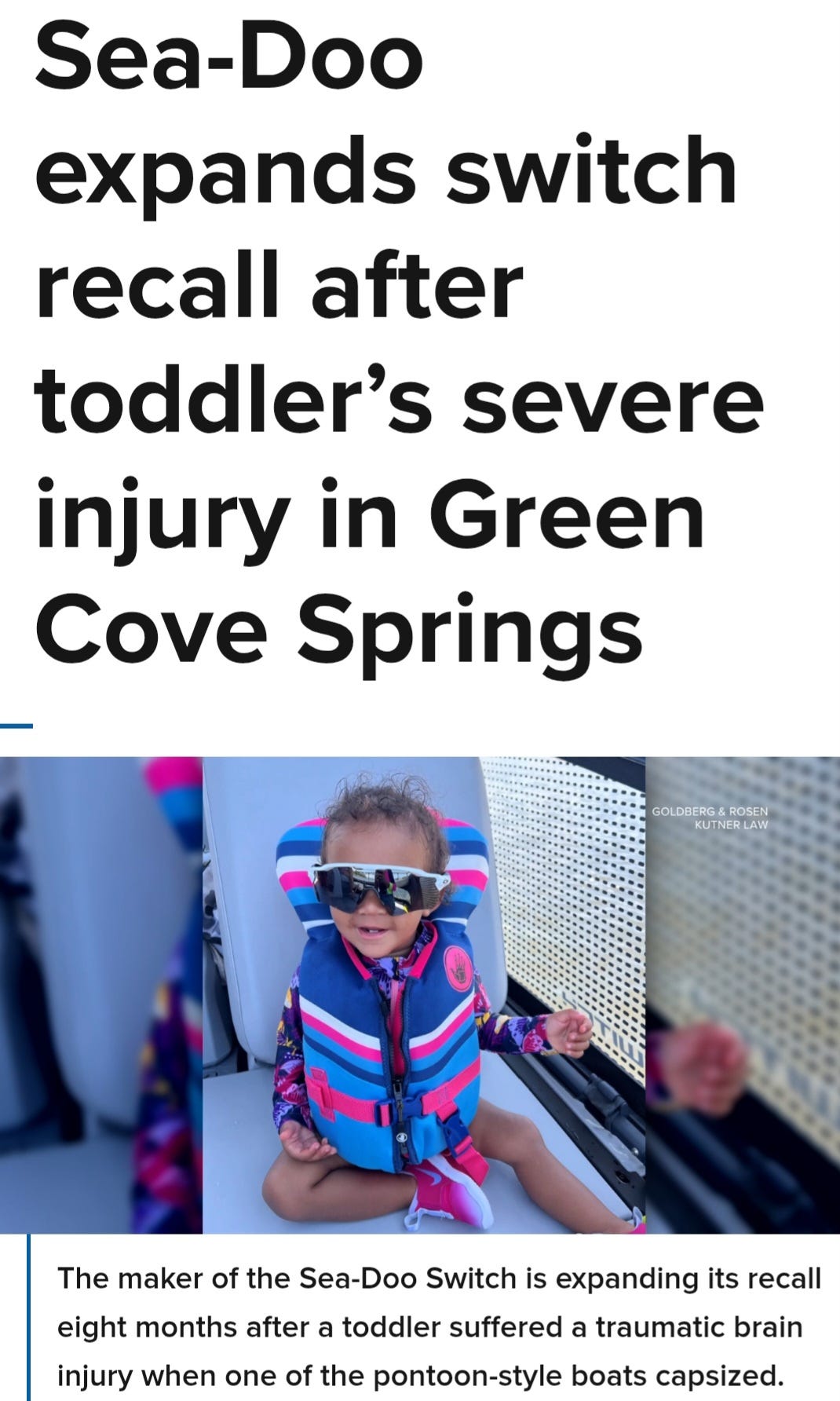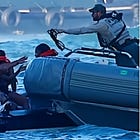Jax TV News Misses the Point in Latest Sea-Doo Switch Story
Don't Blame Dad; Coast Guard Says Even a Good Driver Can Flip One

First Coast News is probably not the worst TV journalism on the planet, but it does continue to annoy. It completely failed to understand the significance of a new development in a horrible boat accident that happened last year at the mouth of Black Creek.
Last week, the station gave us this:
At the risk of nit-picking, let’s note the faulty arithmetic being practiced by First Coast News, which began its story with this:
The maker of the Sea-Doo Switch is expanding its recall eight months after a toddler suffered a traumatic brain injury when one of the pontoon-style boats capsized near Green Cove Springs.
The accident happened on August 25, 2024. The builder of the Switch, the Canadian corporation Bombadier, issued it’s latest safety notice for the hybrid pontoon-jetski vessel on October 17, 2025. So closer to 14 months, not eight.
Dumb mistake but not a huge deal. Maybe the writer was referring to the initial recall notice six months after the event, so less wrong.
The real significance of the information available to First Coast News is that little Vianca’s dad, William Grullon, should not be blamed because of the way his 13-foot Switch flipped over forward, spilling everyone aboard into the water and trapping the toddler underneath.
To begin with, Florida Fish & Wildlife investigated the accident and declined to prosecute. Investigators confirmed that no alcohol was involved, unlike in so many other on-the-water fatalities.
That did not stop local marina people and Switch owners on Facebook from blaming the Grullon family for their daughter’s misfortune. Much of the vitriol was based on the fact that none the adults aboard was able to swim and therefore unable to save Vianca more quickly.
Being able to swim is always a good thing, but the two firefighters who responded to the emergency were both swimmers, and they had an excrutiatingly difficult time finding and recovering Vianca, who had been pinned to the floor of the Switch because of the bouyancy of her lifejacket.
Being able to swim should not be the big issue here: People who spend tens of thousands of dollars on a boat have an expectation that the vessel will stay upright during normal operating conditions. The Coast Guard now warns that the Switch can flip even when waters are calm, and the operator isn’t doing anything wrong.
The first Switch recall happened after the Grullon family filed a $30 million lawsuit against Bombardier, alleging design defects were responsible for crippling their child.
Despite the headline seemingly tying the latest recall notice directly to the 2024 St. Johns River incident, this one actually happened after three women were killed over Labor Day weekend this year after the Switch they were on flipped on a lake in Maine.
As the result of a September 2024 investigation, Clay News & Views was first to figure out how a Switch design flaw was causing the boat to flip when an operator let off on the throttle, not when the boat was going too fast for conditions.
Based on state accident reports and CN&V coverage, which has included an account of another girl’s death from an accident in Virginia, the U.S. Coast Guard launched its own investigation this year (which resulted in an unusual role reversal; a Coast Guard investigator interviewing us).
Issuing a safety alert on October 16 (the day before the latest recall notice), the Coast Guard wrote:
Since the Switch’s introduction in 2022, multiple capsizings have led to several fatalities and severe injuries. These capsizings have occurred when the vessel was operated with trim by the bow and the bow “digging into” the water. Weather conditions and poor seamanship do not appear to be significant contributing factors.
The problem centers around the fact that the outer pontoons of the Switch—sponsons is the technical term—leak. Switch owners had been told that leaking was a feature not a flaw. At rest, the weight of the water would dampen roll, better for the comfort of passengers, they were told.
Once the boat was underway, the water is expelled because of the boat’s forward motion, but not all at once. What if operator slowed the boat down before that happened? As CN&V reported on February 25 just after Bombadier issued its first safety recall:
If it were, say, 10 gallons per hull, that would be 20 gallons total. A gallon of water weighs 8.34 pounds. If a Switch were at rest and then got underway long enough to lose 10 of the 20 gallons out the back, and were then throttled down, a combined 80-plus pounds of water could be sent hurtling forward, filling the half-empty space and helping to force the bow down.
The 10 gallons was hypothetical. The actual amounts could be greater. Nowhere does Switch documentation literature disclose how much water the sponsons will actually take in.
The Switch sponsons are sectional. The first Switch recall involved caulking the sections to prevent water from entering. The owner of the Switch in the Maine accident had undergone the recall work, but apparently water came in anyway, contributing to the boat’s forward flip.
Bombardier acknowledged the problem in their most recent recall, which called for installing gaskets instead.
Here’s what Bombadier wrote to its customers in the notice:
Unfortunately, one component of the previous remedy may not perform to our expectations for durability. The sealant applied on the hull sections (by dealer or from factory) needs to be replaced by three gaskets. For watercrafts already equipped with gaskets, an inspection is required to ensure that all three gaskets are present.
In these notices, Bombadier continued to stress that weight and weight distribution were factors that put Switch operation at risk. Commenting on Facebook, many Switch aficionados defended the performance of the boats, dismissing those who reported flipping over or almost flipping as having ignored weight factors.
Now that the Coast Guard has weighed in, there has been a growing sense of buyers’ remorse evident on these same Facebook groups. Owners have begun to worry about safety, some want their money back and others talk about lost resale value because of the negative publicity, such as this story on CBC news in Toronto, Canada:





